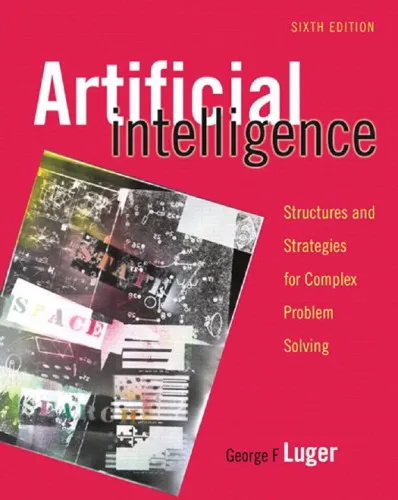Artificial Intelligence. Structures and Strategies for Complex Problem Solving. Sixth Edition
4.4
Reviews from our users

You Can Ask your questions from this book's AI after Login
Each download or ask from book AI costs 2 points. To earn more free points, please visit the Points Guide Page and complete some valuable actions.Introduction to Artificial Intelligence: Structures and Strategies for Complex Problem Solving, Sixth Edition
Written by George F. Luger, the sixth edition of Artificial Intelligence: Structures and Strategies for Complex Problem Solving is one of the most comprehensive and influential resources in the domain of artificial intelligence (AI). Known for its balanced approach to theory, practical applications, and in-depth discussions, this book has been a cornerstone in understanding AI for both students and professionals alike.
Since its inception, this book has sought to demystify the core ideas behind artificial intelligence while maintaining a strong focus on practical application. Updated to reflect the latest advancements in the field, this edition provides insights into the dynamic evolution of AI methodologies, real-world applications, and emerging trends in computation and problem-solving strategies.
Detailed Summary of the Book
This book is a structured primer into artificial intelligence, offering a thorough exploration of complex problem-solving strategies using computational methods and logical reasoning.
The content is organized into multiple chapters that systematically introduce the reader to foundational AI concepts, including knowledge representation, search strategies, natural language processing, inference techniques, machine learning, and robotics. Additionally, the book provides insights into modern topics, such as neural networks, genetic algorithms, and AI ethics.
Unlike other resources, this edition balances theoretical foundations and practical implementations. Luger integrates well-established AI paradigms with cutting-edge topics. Emphasis is placed on problem-solving, reflecting the fundamental goal of AI as a discipline. Through the use of pseudo-code and algorithmic explanations, the book ensures accessibility for readers with varying levels of programming proficiency.
The sixth edition also focuses on modern trends in AI, particularly in areas like probabilistic reasoning, data-driven modeling, and machine learning. These updates are accompanied by historical context to appreciate how AI research has evolved over decades.
Key Takeaways from the Book
- A comprehensive understanding of core AI concepts such as search algorithms, game playing, logic programming, and natural language understanding.
- Practical exposure to problem-solving techniques, designed for applications in real-world domains, including robotics, decision-making systems, and expert systems.
- Detailed explanations of advanced AI areas like machine learning, deep learning, genetic programming, and probabilistic reasoning.
- Thorough analysis of AI's role in society, coupled with discussions about ethical considerations and the future of artificial intelligence as a discipline.
- Hands-on learning with pseudo-code and algorithm documentation for building your own AI systems.
Famous Quotes from the Book
"At its core, artificial intelligence seeks to replicate human problem-solving abilities by computational means, but the true achievement lies in achieving solutions faster or beyond traditional human limitations."
"A good AI system demonstrates its power not just in solving problems, but in adapting to new challenges with strategies that extend its initial programming."
"The interplay between knowledge representation and reasoning defines much of what we consider intelligence. It is in this space where machines and humans can align—or diverge."
Why This Book Matters
In an age dominated by rapid developments in AI, this book serves as a critical guide for both beginners and experts.
One of the most valuable aspects of this book is its ability to bridge the gap between theoretical concepts and practical applications. AI is a rapidly changing field, and the book’s updated content ensures that readers are equipped with the most relevant tools and knowledge to succeed in a competitive landscape.
Furthermore, the book emphasizes AI’s ethical dimensions and societal impacts, making it more than just a technical resource. It encourages readers to think critically about the implications of their work, fostering a sense of responsibility in building AI systems.
Whether you are a student aiming to understand the basics, a professional looking to deepen your expertise, or a researcher exploring new AI frontiers, this book is an invaluable resource. It has inspired countless individuals to enter the field of artificial intelligence and continues to shape the way AI systems are developed and applied.
Free Direct Download
Get Free Access to Download this and other Thousands of Books (Join Now)
For read this book you need PDF Reader Software like Foxit Reader


